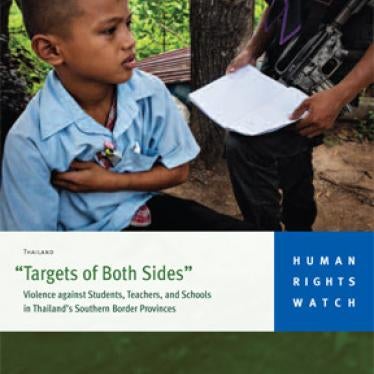"What scares me is the thought that the school could be attacked because the soldiers are at the school," a nine-year-old student in southern Thailand told Human Rights Watch in March of this year. She explained: "students and teachers would be the ones that get hurt.... The schoolchildren and teachers could get caught in the middle."[1]
An increasingly brutal separatist insurgency in Thailand's southern border provinces of Pattani, Yala, and Narathiwat has claimed more than 4,100 lives since it resumed in January 2004. The militants have committed widespread abuses, including targeted killings and numerous bombings against civilians. In response, the Thai government has imposed special security legislation and increased the number of regular and paramilitary troops to around 30,000 in the region.
The insurgents, who view the national educational system as a symbol of an oppressive Thai government, have attacked teachers and schools. There have been at least 327 arson attacks on government schools in southern Thailand since January 2004, and at least 108 government teachers have been killed in the same time.
In a new report, "Targets of Both Sides," Human Rights Watch documents its investigation into attacks on education in the southern border provinces of Thailand. The report investigates several aspects of attacks on education including arson and bomb attacks on government schools, killings of ethnic Thai Buddhist and Muslim Malay teachers, use of schools by the insurgents as sites of indoctrination, government raids on Islamic schools, and the long-term occupation of schools by military and paramilitary forces.
Southern Thailand is one of the most dangerous places in the world to be a teacher. Many teachers have requested transfers from the government to teaching positions outside of the south, and some are willing to accept the financial risk of not finding another permanent position in order to move.
While the vast majority of teachers killed are ethnic Thai Buddhists working at government schools, Muslim teachers have not been spared. Ethnic Malay Muslim teachers who work at government schools, and Muslim teachers who work at Islamic schools but seen as being either too pro-government or insufficiently pro-insurgency, have also come under threat.
Teachers are a "soft target," much easier to strike than police or the military. Insurgents target them because they view teachers as symbols of the oppressive Thai Buddhist government, because insurgents seek to retaliate for abuses by Thai security forces, and because they want to undermine the government's authority. In the southern border provinces between January 2004 and the first week of September 2010, at least 108 government teachers and another 27 education personnel were killed in suspected insurgent attacks.
In its discussion of military occupations of schools, the report distinguishes between occupations that are the response to a direct threat on a specific school, and those that appear to be the result of the government seeking convenient and well-equipped structures in which to house troops. Armed forces that occupy schools are sometimes involved directly in counter-insurgency activities, and sometimes in local development activities. Some military units occupy school buildings, while others set up tents in the school yard.
Human Rights Watch found that when the military came to set up camp in a school, the surrounding community was rarely consulted about the decision. The presence of military and paramilitary forces on school grounds, however, can severely interrupt children's access to education. Almost immediately after occupying a school building, troops fortify the structure, which can mean placing sand bags and barbed wire around the borders of the school grounds, or constructing sentry towers for armed personnel.
Fearful that the presence of soldiers will increase the possibility of a future attack, parents may withdraw their children from schools. In such cases, these students sometimes attend schools further away from their home towns, placing them in further danger as they travel long distances, and putting an increased financial burden on families who have to pay for extra transportation for their children to attend another school.
Students who continued to attend occupied schools reported to Human Rights Watch that some soldiers' behavior made them uncomfortable. Co-habitation with troops can mean children are exposed to gambling, drinking, drug use, and sometimes harassment. One ten-year-old student explained: "I am not happy when the soldiers ask whether I have any older sisters and ask for their phone numbers."[2]
Students, teachers, and schools in southern Thailand face a risk of violence from both insurgents and government security forces. Fearful for their safety and their lives, they are caught in the middle. Classrooms under attack are no place for students to learn. And studying where there are soldiers can pose significant risks for students and teachers, and severely degrade the quality of education. The Thai government is responsible for protecting education from attack, but it is critical that the chosen protection measures do not further harm the students, teachers, and communities striving for safety during this ongoing armed conflict.
[1] Human Rights Watch interview with Siti S., 9 years old, student at Ban Klong Chang Elementary School, Mayo district, Pattani, March 26, 2010.
[2] Human Rights Watch interview with Hasina S., 10 years old, Ban Klong Chang, Mayo district, Pattani, March 30, 2010.
Kyle Knight is a Coordinator in the Children's Rights Division of Human Rights Watch.







